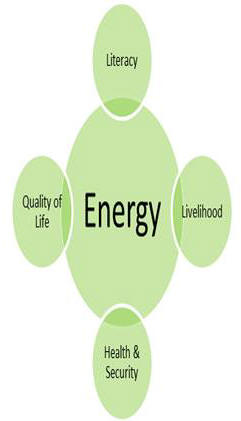|
Energy for Women
E nergy is at the center of life. Role of energy in enhancing socio-economic well being of people has been articulated for many years. Energy has a close relationship with women becouse there is scarcity of energy for meeting a host of their day-to-day needs. Energy inhabits the centre stage in almost all women’s daily activities – cooking, access to clean water, agriculture, education and employment generation. The vast majority of rural households have little or no access to modern energy, and what they can afford meets only a narrow segment of their needs at a subsistence level of consumption. These women, along with millions of their counterparts in urban settlements, continue to rely on traditional fuels and under-developed technologies that waste resources and injure health.How does energy help? A significant chunk of women’s economic contribution is unpaid, unrecognised and underestimated. This results in lesser investment in technological interventions for women to improve their living conditions. Women spend a significant time on their daily routine survival tasks which is almost invisible in current methods of reporting energy patterns and statistics. Access to energy can help women save manual labour and increase their efficiency. Since most women’s income-earning activities are based on human labour, greater attention should be paid to energy services that can directly substitute or reduce the labour content of production – meaning specifically efficient fuels/electricity and related equipment/appliances to process heat and motive power. Such a strategy will improve product quality and increase production volume, with a potential for significant breakthroughs in income levels. SPEED – An Innovative Solution Smart Power for Environmentally-Sound Economic Development (SPEED), an initiative of the Rockefeller Foundation (RF) facilitates enhanced access to affordable energy services, particularly electricity, from clean energy sources in underserved regions of the country, thereby improving the quality of life and enhancing livelihood security. This programme aims to create a positive impact on the lives of poor rural communities in India especially women through delivery of more affordable, reliable and clean energy services. Small-scale, off-grid, renewable energy systems have been identified as the most appropriate, convenient and economically viable, first-choice option for generating power and providing energy access to remote rural communities. Small-scale renewable energy systems – domestic and community biogas, biomass gasifier, micro-hydro and solar and wind systems – have been identified as the main alternative source of energy for remote rural areas. These kind of approaches are imperative for rural women to improve their quality of life. Health and security are key concerns for rural women. In India, accidental kerosene poisoning of children and devastating housing fires caused by kerosene devices can be prevented by providing energy access. Insufficient lighting during the night poses a security threat for women. Rural electrification can contribute to women safety and also improve their efficiency in routine work. Women need adequate energy supply for their small- and medium-scale enterprises. They rely on diesel which is quite expensive and less profitable. Examples of energy-intensive micro enterprises usually operated by women include food-processing industries, incense-sticks and candle manufacturing enterprises. Women’s ‘invisibility’ in the energy sector is due to lack of acknowledgement of their contribution to society, to their lack of access to education and to their limited engagement in technological progress. Nevertheless, in the context of rural India where women’s lives are marked by gender inequalities, access to clean and renewable energy services can catalyse economic, social and cultural processes that improve gender equality and women’s empowerment. q Akash Mittal
|
